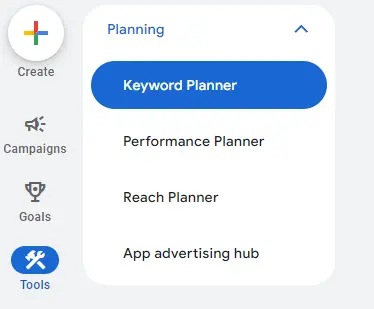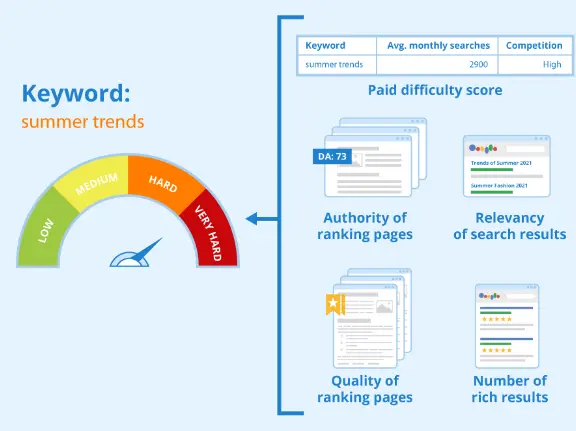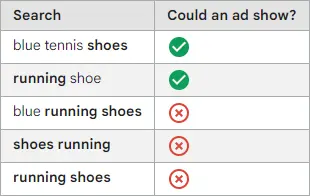Have you ever wondered how websites manage to rank at the top of Google search results?
The answer lies in keyword research. If you run an online business or simply want to improve your website’s visibility, it’s essential to understand what terms your target audience uses when searching for products or services like yours. In this article, I’ll walk you through how to master keyword research and why it’s a crucial part of any successful SEO strategy.
Step by step, you’ll learn how to identify the most important keywords and which tools you can use to optimize your SEO approach. These insights will help improve your site’s rankings in organic search results.
Keyword research is one of the cornerstones of search engine optimization (SEO). It helps you understand what people are searching for and which keywords potential customers use when looking for products or services. This research gives you clarity on how to align your content with the right audience and improve your visibility on search engines.
When done right, keyword research helps you discover high-impact search terms and match your content to real user intent. One of the best tools to get started is Google Keyword Planner, a free and powerful keyword tool that simplifies the analysis process, especially for beginners.
The Role of Keywords in SEO
Keyword research isn’t just about finding the most popular search terms, it’s about understanding what your users are really looking for and creating content that meets those needs.
SEO keywords are central to any effective strategy. Well-chosen keywords help ensure that your site appears when users search for specific products or services on Google. With Google keyword research, you can even gain insights into what your competitors are targeting and use that knowledge to optimize your content and gain a competitive edge.
To succeed with SEO, it’s essential that both your keywords and the content around them align with the user’s true search intent.

Understanding Search Intent: Transactional, Informational, and Navigational Keywords
Search engine users can generally be grouped by their intent into three categories: transactional, informational, and navigational (or branded searches).
First, transactional keywords are tied directly to a purchase decision. The user knows exactly what they want and is ready to buy. By targeting and ranking for these keywords, you can increase your return on investment (ROI), as these terms are used at the final stage of the customer journey when they are about to convert.
Second, informational keywords tend to drive more traffic, but this traffic is usually considered “cold.” These users are seeking solutions to their problems, but are not necessarily ready to make a purchase. While informational keywords can bring high search volumes, they don’t usually convert well. That’s why they shouldn’t be your top SEO priority, but they can still be valuable for long-term strategy, brand awareness, and nurturing potential customers over time.
Finally, navigational or branded keywords bring users who are specifically searching for your business or brand. These keywords often start driving results only after you’ve invested in brand visibility. When people begin typing your company name or product directly into search engines, it’s a strong signal that your brand is gaining recognition and trust.
Harness the Power of Keywords with a Strong SEO Strategy
Top Tools for Keyword Research: Google Keyword Planner and More
When starting your keyword research, make the most of powerful tools like Google Keyword Planner and Google’s keyword planning tools. These platforms give you a clear overview of which keywords drive the most traffic and how competitive they are.
The Google Ads keyword tool is also a valuable resource, especially when you’re focusing on paid advertising. It provides insights into keyword competitiveness, estimated cost-per-click (CPC), and how much advertisers are bidding for each term.
How to Do Keyword Research with Google Keyword Planner
Google Keyword Planner is an excellent tool when you want to better understand which search terms people are using to find information. You can start by listing your most important keywords and analyzing their search volume and competition level. The tool also suggests related keywords that you can incorporate into your strategy.
This step is especially helpful when optimizing your website with SEO keywords or planning paid campaigns using Google Ads keywords.


Negative Keywords: Why They Matter
One of the most overlooked but essential concepts in keyword strategy is the use of negative keywords. These help ensure your ads don’t show up for users searching for irrelevant or low-quality traffic.
By excluding certain terms, you can reduce wasted ad spend and focus your budget on traffic that is more likely to convert. Negative keywords play a key role in keeping your campaigns efficient and results-driven.
What Is Keyword ROI and How Can You Calculate It?
Keyword ROI (Return on Investment) helps you measure how effectively your campaigns generate value compared to their cost. In search advertising, calculating ROI is crucial because it allows you to optimize your budget and focus on the keywords that bring the best return.
With this calculator, you can easily estimate the ROI of your keywords by entering the following data:
Using Keywords in Search Engine Optimization (SEO)
Once you’ve identified your most important search terms and keywords, it’s crucial to know how to place them strategically in your content. Search engines like Google value content where keywords are used naturally and in the right locations. These key areas include:
Headings
Your primary keywords should be included in headings, such as “Google Keyword Research,” which are powerful and effective.
Meta Descriptions and URLs
Keywords should also appear in URLs and meta descriptions to enhance visibility.
Beginning of Content
It’s important to place keywords early in the text, as search engines tend to prioritize that placement.
Competitor Analysis: Identify Keywords and Search Terms
Competitor analysis is an essential part of successful keyword research.
SEO keyword research requires understanding which keywords your competitors rank highly for and where their weaknesses lie. This way, you can optimize your own keywords and find a competitive edge.
Tools like SEMrush and Ahrefs help you uncover your competitors’ SEO keyword strategies and identify the terms you can use to stand out.

In a Nutshell, Effective Keyword Research and SEO
Keyword research is a critical part of successful search engine optimization. Tools like Google Keyword Planner and Google Ads keyword tools provide concrete ways to analyze keywords and optimize your campaigns.
Don’t forget to use negative keywords as they help improve campaign efficiency and reduce wasted spending.
Continuously tracking and optimizing your keywords is key to long-term success, especially in competitive markets. Take time to analyze your competitors and regularly update your keywords to ensure your site stays visible and successful in search engines.
Frequently Asked Questions
What are the best tools for conducting keyword research?
The best tool for keyword research is definitely the Google Ads Keyword Planner. It provides the most reliable and accurate data, such as search volume and competition levels. The tool is also free, making it accessible to everyone.
While there are many paid tools on the market, they typically only estimate Google’s data, so it makes sense to use a source that provides information directly from Google.
How to choose the best keywords for your website?
Choosing keywords is most effective when aligned with your business goals. It’s important to prioritize keywords that drive hot traffic, visitors who are ready to make a purchase decision.
For example, targeting transactional keywords, related to buying intent, can often deliver the best results.
What are the benefits of Google Keyword Planner?
First of all, Google Keyword Planner is a free tool, which is a big advantage especially for small businesses and new marketers.
It provides the most accurate search volume and competition data, as it’s based directly on Google’s own search data.
While many paid tools try to replicate this information, none truly match Google’s own data source.
What are the most common mistakes in keyword research?
One of the most common mistakes is failing to validate search intent, trying to match the wrong type of intent.
This can cause internal competition between your own pages or prevent your site from ranking well, as Google interprets search intent differently.
Another major mistake is overusing keywords, known as keyword stuffing, which leads to unnatural content and a poor user experience.
A third common mistake is focusing only on highly competitive seed keywords.
Many websites ignore long-tail keywords, which may have lower search volume but still match the same search intent.
These long-tail keywords can help you rank in the medium to long term, even for more competitive topics.
What is the difference between keywords and search terms?
There is no difference. Keywords and search terms mean the same thing and are often used interchangeably in the context of SEO and search engine marketing.
Why is it important to use the same keywords on your page and in your ad targeting?
It’s important to use the same keywords both on your landing page and in your ad targeting, as this ensures your ads appear in search results for users who are already interested in the topic.
This improves both visibility and ad relevance, leading to a higher click-through rate (CTR) and a better Quality Score in Google Ads.
Additionally, this approach aligns your paid campaigns with your organic traffic strategy, improving rankings and making your budget usage more effective.



